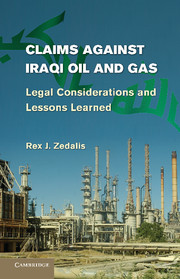Book contents
- Frontmatter
- Contents
- Preface
- PART ONE
- PART TWO
- PART THREE
- 5 The Concepts of “Finality,” “Related to,” and Assorted Matters: Article 54 of the KRG Oil and Gas Law (No. 22) and Article 141 of the Iraqi Constitution
- 6 Old Oil and Gas Contracts and Those of More Recent Vintage: Iraqi Constitutional Protections of Contract Rights and Their Significance on Legal Claims
- 7 Oil and Gas Assets Affected by the Prosecution of Legal Claims Aimed at Recovering on Debts Owed by Iraq
- 8 Issues Associated with Prosecuting a Claim in the United States with a Glimpse at Other Jurisdictions: The Impact of National Law
- 9 Recognition and Enforcement of Determinative Actions Affecting Iraqi Oil and Gas Assets
- 10 Lessons Learned from the Iraqi Experience Transferable to Other Instances of Debt Owed by Resource-Rich Nations
- Epilogue
- Index
10 - Lessons Learned from the Iraqi Experience Transferable to Other Instances of Debt Owed by Resource-Rich Nations
Published online by Cambridge University Press: 05 August 2011
- Frontmatter
- Contents
- Preface
- PART ONE
- PART TWO
- PART THREE
- 5 The Concepts of “Finality,” “Related to,” and Assorted Matters: Article 54 of the KRG Oil and Gas Law (No. 22) and Article 141 of the Iraqi Constitution
- 6 Old Oil and Gas Contracts and Those of More Recent Vintage: Iraqi Constitutional Protections of Contract Rights and Their Significance on Legal Claims
- 7 Oil and Gas Assets Affected by the Prosecution of Legal Claims Aimed at Recovering on Debts Owed by Iraq
- 8 Issues Associated with Prosecuting a Claim in the United States with a Glimpse at Other Jurisdictions: The Impact of National Law
- 9 Recognition and Enforcement of Determinative Actions Affecting Iraqi Oil and Gas Assets
- 10 Lessons Learned from the Iraqi Experience Transferable to Other Instances of Debt Owed by Resource-Rich Nations
- Epilogue
- Index
Summary
Introduction
When determining the lessons learned from the experience of insulating Iraqi oil and gas assets from claims by creditors – and the extent to which those lessons are transferable to other instances of debt owed by resource-rich nations – it is imperative to be aware of the enormous diversity of situations and circumstances that may exist. There are basic lessons from the Iraqi case that are generally applicable to a host of other comparable cases. Comment will be made on many of these in the pages that follow in this chapter. At the same time, however, recall that the Iraqi situation is somewhat unique.
For starters, the resource with which Iraq is rich is essential to the functioning of the fundamental elements of modern society. At some point in the near future, there is likely to be a shift toward greater dependence on renewable sources of energy to power the wheels of commerce and transportation. At present, the world remains largely dependent on fossil fuels and, when it comes to assuring rapid personal mobility, the dependence on such is total. Additionally, Iraq is situated in one of the world's principal international political hotbeds. The Arab–Israeli crisis has confounded and bedeviled the world community for the past half-century.
- Type
- Chapter
- Information
- Claims against Iraqi Oil and GasLegal Considerations and Lessons Learned, pp. 221 - 240Publisher: Cambridge University PressPrint publication year: 2010



